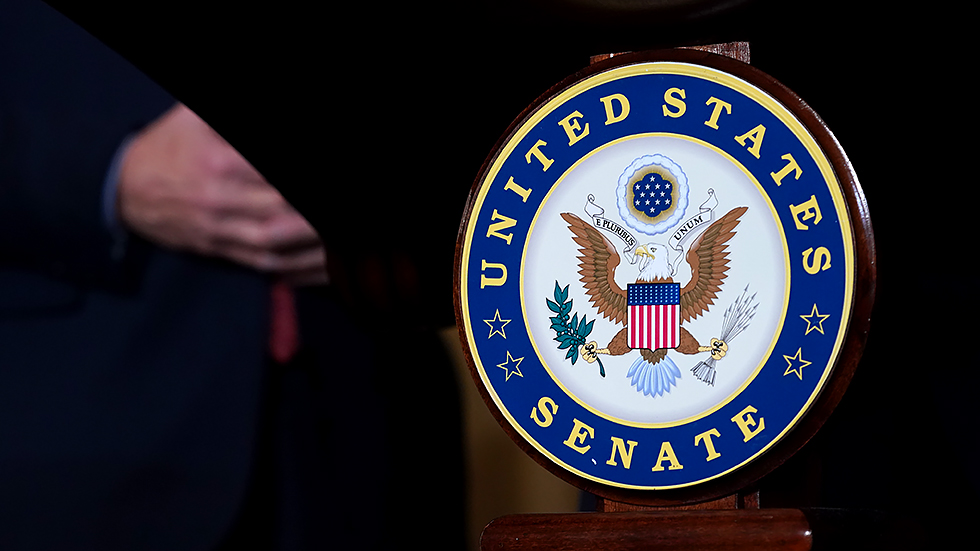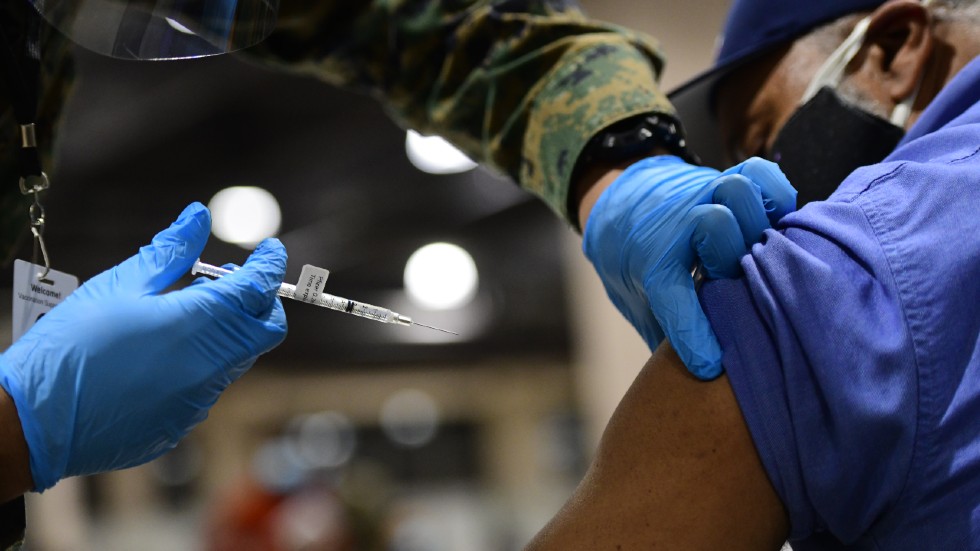Overnight Defense & National Security — US tries to deter Russian invasion of Ukraine
It’s Friday, welcome to Overnight Defense & National Security, your nightly guide to the latest developments at the Pentagon, on Capitol Hill and beyond. Subscribe here: digital-stage.thehill.com/newsletter-signup.
President Biden said that his national security team is putting together a “set of initiatives” to make it “very, very difficult” for Russia to invade Ukraine amid rising tensions on the border between both countries.
We’ll share what we know about these initiatives plus details of the Senate’s plan B with the annual defense authorization bill and the latest Pentagon official to test positive for COVID-19.
For The Hill, I’m Ellen Mitchell. Write to me with tips: emitchell@digital-stage.thehill.com.
Let’s get to it.
Biden says team working on deterrence plan

The Biden administration is working on several initiatives to make it “very, very difficult” for Russian President Vladimir Putin to invade Ukraine.
“I have been in constant contact with our allies in Europe, with the Ukrainians. My secretary of State, national security adviser have been engaged extensively and what I am doing is putting together what I believe will be the most comprehensive and meaningful set of initiatives to make it very, very difficult for Mr. Putin to go ahead and do what people are worried he may do,” Biden told reporters Friday when asked about the situation.
“That’s in play right now,” he added.
What are these ‘initiatives’?: Biden did not elaborate on the “initiatives” his administration is working to craft. Secretary of State Antony Blinken on Thursday threatened coordinated sanctions on Russia if it does not reverse its military buildup on the border with Ukraine.
White House press secretary Jen Psaki later told reporters that the administration is engaged in consultations with European allies and with Congress to “make sure that we are prepared” should Putin invade Ukraine.
She also indicated that additional security assistance to Ukraine was under consideration, but declined to further elaborate.
A looming threat: Russia has amassed some 90,000 troops on the border with Ukraine, leading to fears about Moscow preparing to invade the country.
Upcoming talks: Biden and Putin are expected to speak sometime in the near future, though the White House has not given a specific timeline for the call. The two leaders held their first in-person meeting in Geneva over the summer.
Senate eyes plan B amid defense bill standoff

Senators are mulling pulling a sweeping defense bill that has been stuck in limbo for days and instead cutting a deal with the House on a final version of the legislation.
The Senate left town for the week without an agreement on a path forward for the National Defense Authorization Act (NDAA), a sweeping bill that sets spending top-lines and policy for the Pentagon.
The typical way: Typically both the House and Senate pass a version of the NDAA, then they hold a formal conference committee where they negotiate a final version that is then taken up by both chambers.
The holdup: But GOP Sen. Marco Rubio (Fla.) is blocking an amendments package on the NDAA until he either gets a vote, as part of the defense bill, on his amendment banning imports from China’s Xinjiang region, where administration officials have accused the government of carrying out genocide against Uyghur Muslims; or action in the House, where his proposal has stalled for months.
The new plan: Absent a quick resolution, senators said that the Senate is expected to scrap trying to pass its own defense bill and instead work out a deal with the House on the final version of the legislation, which would then be passed by the House and sent to the Senate.
“I think there’s still a small hope that we’re going to be able to consider amendments on the floor, but if not, I think you’re going to see action taken in a de facto conference,” said Sen. Ben Cardin (D-Md.).
Sen. Mike Rounds (R-S.D.) said that he viewed leapfrogging a vote on a Senate bill and skipping to the unofficial conference as the most likely option, adding: “That’s been plan B all week.”
The lead up: Leadership on the House and Senate Armed Services committees has already been trying to work out potential sticking points between their two versions of the bill.
That plan could come together quickly as Congress barrels toward the end of the year with a long to-do list. An update on the House’s floor schedule for next week from Majority Whip Steny Hoyer (D-Md.) indicated that the lower chamber would vote for a second time on the defense bill.
Top Guard official in isolation
 National Guard Bureau Chief Gen. Dan Hokanson is in isolation after testing positive for COVID-19 this week, the military announced Friday.
National Guard Bureau Chief Gen. Dan Hokanson is in isolation after testing positive for COVID-19 this week, the military announced Friday.Hokanson is “working remotely and isolating himself from contact with others,” following the positive test, National Guard Bureau spokesman Wayne Hall said in a statement.
Following protocol: All other members of the bureau staff are continuing with their duties under the Pentagon’s existing coronavirus protocols and continue to be tested as required, Hall added.
Ironic timing: The new case comes as the state of Oklahoma is in the midst of a fight with the Pentagon and the Biden administration over a coronavirus vaccine mandate for the National Guard.
Back and forth: The Pentagon in late August required vaccinations for the military, but in early November, Oklahoma Gov. Kevin Stitt (R) asked Defense Secretary Lloyd Austin to exempt his state’s National Guard from the vaccine mandate.
Stitt also ordered a memo stipulating that no member of the Guard is required to get vaccinated.
Austin on Tuesday pushed back with his own memo stating that the Guard and Reserve service members who do not comply with the mandate can face loss of pay and will be marked absent without cause from drills and training – a move which would impact days service members accrue towards retirement.
In response, the state of Oklahoma on Thursday filed a federal lawsuit seeking to prevent the mandate for guardsmen.
Case numbers now: The new COVID-19 case also marks the first time in more than a year a senior defense official has contracted the virus.
In that case, Coast Guard vice commandant Adm. Charles Ray tested positive for coronavirus in October 2020, forcing several top generals – including Joint Chiefs of Staff Chairman Gen. Mark Milley — to quarantine after they were in a meeting with him prior to his positive test.
A total of 77 service members have died from COVID-19 and more than 251,300 have contracted the virus, according to the latest Pentagon data released Monday.
ON TAP FOR MONDAY
- The National Defense Industrial Association will hold its “2021 Virtual Systems and Mission Engineering Conference,” beginning at 9 a.m.
- The Air Force Association will host a conversation on “Air and Space Warfighters in Action,” at 9:30 a.m.
- The Cato Institute will hold a discussion on “Congress and War: Reclaiming Article I Powers” at 12 p.m.
- The Institute of World Politics will host a discussion on “National Readiness for Great Power Competition” with former U.S. Central Command head retired Gen. Joseph Votel at 5 p.m.
- The Senate Foreign Relations Committee will hold a hearing on an “Update on U.S.-Russia Policy” at 6 p.m.
WHAT WE’RE READING
-
Oklahoma sues to exempt National Guard from Pentagon vaccine mandate
-
US planning global push to restrict surveillance tools to authoritarian regimes
-
Ukraine says Russia has amassed more than 94,000 troops along border
-
Federal watchdog warns security of US infrastructure ‘in jeopardy’ without action
-
The Associated Press: ‘We just feel it’: Racism plagues US military academies
-
Military Times: VA won’t fire employees for refusing the COVID vaccine until after the holidays
-
Military.com: Navy Admits Pearl Harbor Well Is Contaminated with Petroleum; Families Are Frantic
That’s it for today! Check out The Hill’s defense and national security pages for the latest coverage. See you Monday.
Copyright 2023 Nexstar Media Inc. All rights reserved. This material may not be published, broadcast, rewritten, or redistributed. Regular the hill posts
Video/Hill.TV










